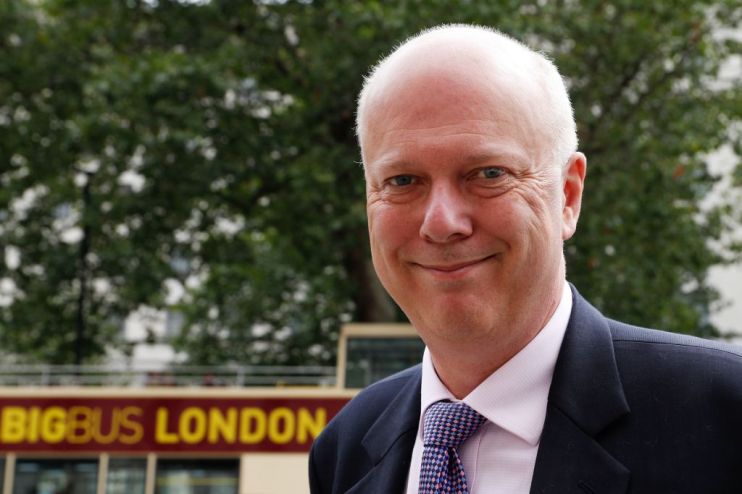Farewell, Failing Grayling: Here are your five finest moments in office

Any article written about transport secretary Chris Grayling over the past year has tended to start with a not-so-favourable adjective.
“Embattled”, “Beleaguered” and “Failing” spring to mind.
As of this week, Grayling – who is likely to be ousted as the head of the Department for Transport (DfT) when Boris Johnson enters No.10 – can enjoy going back to being plain old Chris Grayling.
Read more: Chris Grayling admits Cabinet overruled him on Eurotunnel ferry settlement
That’s not to say that his time as transport secretary hasn’t been eventful. In fact, it’s been an even bumpier ride than commuters can expect on any of his rail franchises.
Here we give a run down of Chris Grayling’s five most memorable moments while in charge of Britain’s chaotic railways.
And, of course, we can’t forget the UK’s water-tight no-deal Brexit ferry strategy.
Rail pensions dispute – £200m potential cost
The DfT landed itself in hot water when it when it awarded the East Midlands franchise, currently run by Stagecoach, to Dutch firm Abellio.
The department had excluded Stagecoach from that franchise, and two others, for its refusal to accept open-ended pension liabilities with the government.
Arriva was disqualified from the East Midlands franchise for the same reason. The DfT said both operators were responsible for their exclusion because they knowingly submitted non-compliant bids.
Stagecoach and Arriva are now suing the DfT over its handling of the procurement process, claiming that the obligation to share an unquantified risk was unfair. If successful, the court actions could land the department with a hefty legal bill.
As exclusively revealed by City A.M. last week, Arriva alone is seeking £200m over the snub.
Grayling admitted at his final Transport Select Committee appearance that exclusion was “not something I would have chosen to do” but that the decision was based on legal advice given to the department.
Read more: Chris Grayling slammed for ‘trainwreck’ HS2 payout to Heathrow Airport
Eurotunnel’s no-deal Brexit ferries settlement – £33m
Jaws dropped earlier this year when Eurotunnel, the operator of the Channel Tunnel between Dover and Calais, wrangled a £33m payout from the DfT over its handling of contracts to ferry firms in the event of a no-deal Brexit.
Aside from the fact that one firm didn’t actually own any ferries (more on that later), Eurotunnel accused the DfT over holding a “secretive” bidding process from which it claims it was excluded.
That payout resulted in P&O Ferries suing the government for £33m, and demanding Eurotunnel’s settlement was reversed.
Last week Grayling admitted that he had wanted to fight the case in court, but was overruled by Cabinet.
Grayling said Cabinet had decided it could not jeopardise the supply of goods to the NHS, which was why it had sought extra ferry capacity in the event of a no-deal Brexit.
“It is a matter of great regret to me that an organisation that has been excluded by the Competition and Markets Authority for running a ferry operation took us to court on the basis that it should have been invited to run a ferry operation,” he said at his last Transport Select Committee appearance.
No-deal Brexit ferry contracts – £50m
Grayling came under intense fire when it was revealed that the DfT had awarded a £13.8 contract to run ferries in the event of a no-deal Brexit to a firm that… owned no ferries.
It transpired that Seaborne Freight had never run a ferry service before and had copied terms and conditions from a pizza delivery firm.
In May this year, the department faced further embarrassment when it cancelled the contracts it had awarded to Seaborne Freight, DFDS and Brittany Ferries, at a cost of about £50m to the taxpayer.
Read more: Government cancels no-deal Brexit ferry contracts at £50m cost to taxpayer
East Coast mainline ‘bail out’
Rail services on the East Coast mainline were brought back into government control last June following a collapse in the franchise, which was run by Stagecoach and Virgin Trains.
The new service is now known as the London North Eastern Railway (LNER) and will be operated by the DfT until a new partnership is appointed in 2020.
Grayling said the franchise had failed because Stagecoach and Virgin Trains had “got their bid wrong” and had overestimated the profitability of the line, which they had based on passenger numbers that had failed to materialise.
Stagecoach and Virgin lost almost £200m on the line. The early termination of the contract led to accusations from the Labour party that the government had “bailed out” the train operators, but Grayling insisted that Stagecoach would be “held to all of its contractual obligations in full”.
May 2018 rail timetable chaos
Nothing quite revealed the chaotic state of Britain’s railways last year as the May timetable chaos, when the introduction of a new timetable sent the industry into meltdown.
Thousands of trains were delayed, cancelled and overcrowded, and a full finger-pointing blame game swiftly followed.
A subsequent report by Office of Rail and Road (ORR) boss Stephen Glaister found that the DfT, Network Rail and the ORR itself all missed opportunities to prevent the weeks of delays and cancellations.
Grayling insisted he was not to blame for the disruption, saying: “I don’t run the railways.” As the misery continued, some were inclined to agree with him.
Read more: All aboard the blame train: Government, regulator and train firms all failed in rail chaos
The sorry saga led to the government commissioning a “root and branch” review of the railways by former British Airways boss Keith Williams, who so far has said the DfT needs to “step away” from day-to-day control of the railways.
His findings are due to be published shortly.